How to be happy: Choose (your) Struggle
Disclaimer: I’m not recommending you quit your job or make major changes to your life. I’m simply saying that I did. I do me, you do you, and somehow we’ll figure this thing out.
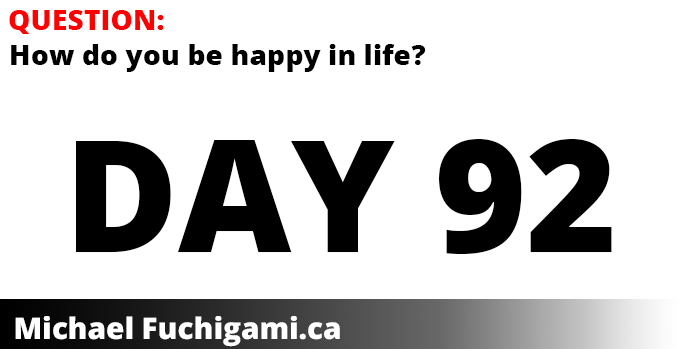
Instead of asking what do you want out of life, ask yourself what problems are you willing to put up with? Happiness comes from the process of solving problems.
Today, April 3, 2019, is the one-year anniversary of the beginning of the end of my teaching career, and the beginning of the next phase of my life.
Last year, I was angry. And hurt. And depressed.
I think Mark Manson would say that I need to say “fuck it” and to practice his subtle art of not giving a fuck. I haven’t mastered his shock factor zen, yet, but I’m working on it.
Today, I’m still in a mental health crisis, but I’ve also chosen a different set of problems to deal with. Out of the frying pan and into the fire, as it were, but I do like campfires. Fond memories of scouting days and toasty marshmallows…
To protect my mental health, and to advocate for student mental health, I quit my Grade 8 classroom teaching job at Longfields Davidson Heights and left the teaching profession.
Now, I am reinventing myself as …
- A teacher: I create teaching lessons to help build character, resilience and life skills in students
- An entrepreneur – I do digital marketing for small businesses in Ottawa to help them get more business from the internet
- An advocate – I am working towards systemic changes in the Ontario education system, and I am fundraising for children’s mental health organizations.
It’s a long road, but I can see a path up the mountain. Let’s begin!
Table of Contents:
- Wisdom from the Subtle Art of not giving a f*ck
- So, what struggles are you willing to enjoy
- The point isn’t to get away from the shit – the point is to find the shit you enjoy dealing with
- Which brings me to the wisdom of Harry Potter
- The secret sauce [of happiness] is in the solving of the problems, not in not having problems in the first place.
- Name your Pain!
- Keep Moving Forward
- So, the bottom line is I can’t give up.
…
Wisdom from the Subtle Art of not giving a F*ck
The ideas from Mark Manson’s blog and his pretty orange book seem to revolve around figuring out your priorities on the things that really matter: “Friends. Family. Purpose. Burritos.”
And, while I’m not a big burrito guy, I can certainly relate to his common-sense wisdom.
Right now, I’m thinking about pain. And choice.
And the power that comes from realizing that you can choose what kind of pain you want to have in life.
I used to think it was about what you wanted:
- What do you want out of your job?
- What do you want out of your relationship?
- What do you want out of life?
According to Mark, it’s not so much about what you want, but rather, what pain you’re willing to put up with and enjoy.
Seems a little masochistic, but he explains it a lot better in his section on choosing your struggles:
“Who you are is defined by what you’re willing to struggle for. People who enjoy the struggles of a gym are the ones who run triathlons and have chiseled abs… People who enjoy long workweeks and the politics of the corporate ladder are the ones who fly to the top of it. People who enjoy the stresses and uncertainties of the starving artist lifestyle are ultimately the ones who live it and make it.” (Pg 40)
So, what struggles are you willing to enjoy?
When your life splatters on the windshield of change, it’s as good a time as any to think about choices.
You didn’t choose to get hit by that metaphorical car, but apparently you get to choose how to deal with the aftermath.
Maybe you’re having a mid life crisis, maybe you just got out of a long-term relationship, or maybe you’re just going nuts!
For me, the epiphany came from this quote:
“The point isn’t to get away from the shit. The point is to find the shit you enjoy dealing with.”
There are a lot of quotable Manson gems, and I like that one a lot.
It got me thinking. Do you like the problems…
- in your job?
- in your relationship?
- in your life?
If not, then, what problems would you like to deal with?
I used to think it was about goal setting and finding the desire and drive to reach your goal. And when problems came up, well, find ways to enjoy the process of overcoming those mountains.
And, I still think there’s value in that approach.
But, right now, I’m starting to wonder if there’s value in thinking about life as a really big game of “would you rather…”
Which brings me to the wisdom of Harry Potter.
This summer, my daughter was reading the fifth book and reminded me of the part where George and Fred fly off into the sunset.
The two Weasley twins are tired of the pain caused by Umbridge and her tyrannical stance on education.
Faced between the challenges of entrepreneurship and the repression in the classroom, they chose to open Weasleys’ Wizarding Wheezes in Diagon Alley.
‘George,’ said Fred, ‘I think we’ve outgrown full-time education.’
‘ Yeah, I’ve been feeling that way myself,’ said George lightly.
‘Time to test our talents in the real world, d’you reckon?’ asked Fred.
‘Definitely,’ said George.
If you are angry, or anxious, or depressed, or stuck, or frustrated, or disappointed, or insert-mid-life-crisis-comment-here, you might enjoy Mark’s potty-mouth wisdom.
Mark argues that, “Happiness comes from solving problems.” The goal is to enjoy the journey, as opposed to the destination.
We know this. Life is the journey, and not the destination. Literally.
And yet, why are so many of us stuck in the rat-race, and choose to stay stuck?
- The benefits are good and the pay is nice.
- I don’t want to lose my seniority.
- I don’t want to start over in a new career.
I get it. As someone who used to make $98,000 per year, and now makes $0 per year from an employer, I wouldn’t wish this pain and uncertainty on anybody.
(Don’t worry. I’m not literally making $0 per year right now. At my current rate of entrepreneurial growth, I’ll maybe bring in $12,000 this year. Baby steps!)
“The secret sauce [of happiness] is in the solving of the problems, not in not having problems in the first place.”
So, when life is overwhelming, (and I guess even when it is underwhelming… or just plain whelming), this is a secret to happiness:
When you’re finally able to overcome your problems…
- You will feel overwhelming joy and zen!
- And your problem-solving will create the next series of bigger problems to enjoy.
“True happiness occurs only when you find the problems you enjoy having and enjoy solving.”
So, if pain and problems are inevitable, the key is to choose your pain.
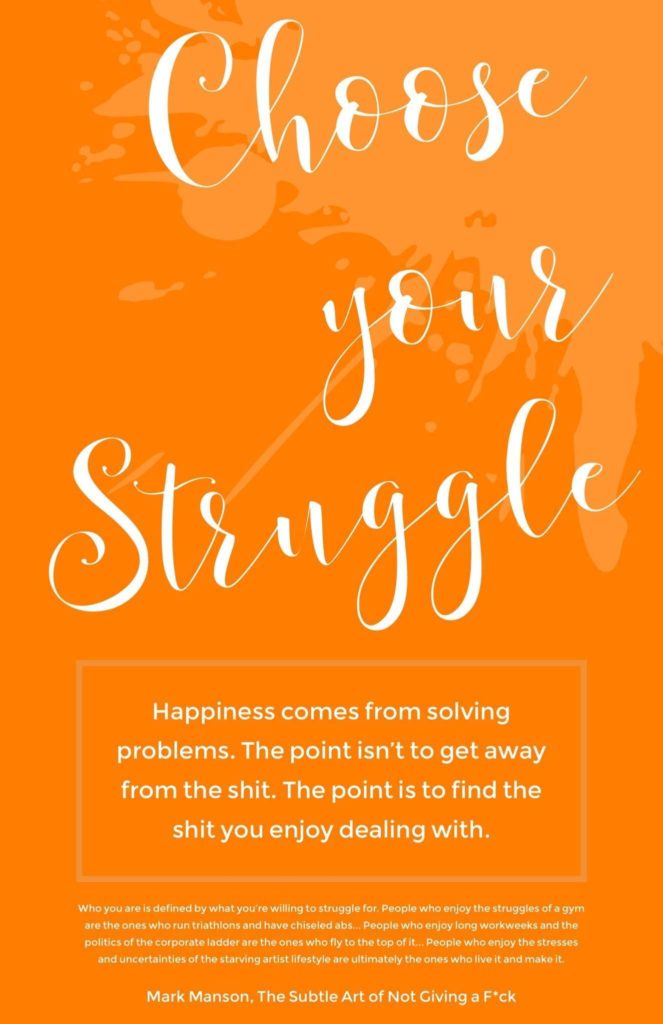
Name your Pain!
Last year, another teacher at Longfields asked me what I wanted out of life.
(Actually, I think he phrased it more like what would you do if you weren’t doing your current job? How very prophetic.)
Manson thinks we should be wondering a different question:
“What pain do you want in your life? What are you willing to struggle for?”
Hmm. If you don’t enjoy the pain of your current job or relationship or situation, well, what pain would you like to enjoy instead?
Great question, Mark. Great question.
Keep Moving Forward.
Even though I might have chosen different shit to deal with when I resigned from the OCDSB, I still have to figure out a way to deal with stuff.
Whether you’re cleaning up horse poop, or unicorn poop, you’re still shovelling poop. (Although unicorn poop might be magical and sparkly.)
Obviously some moments are tougher than others. What keeps me going?
1. Friends and family.
When you lose your job, it’s a tough hit. Thanks to all of the friends and family who have checked in with me to make sure I’m okay. Appreciate it.
Also, thanks for all of the coffee!
2. Wisdom from the internet.
I’m not the first person to struggle with depression and life obstacles. Nor will I be the last.
But, the nice thing about the internet is the ability for you to find your people and to find hope (if you can ignore the negative noise.)
Over the past year, I’ve connected with like-minded people that I never would have met if it wasn’t for the interweb. Our paths simply wouldn’t have crossed.
I’ve also found inspiration from what other people have written:
For example, when 13 Reasons Why came out, I think it’s cool that Tony Pontes, Director of Education in the Peel District School Board wrote a letter to parents just to make sure they were aware of the “misconceptions and misinformation about suicide” that the show presents.
Pontes ends with the line, “Thank you for partnering with us to support student mental health and well‐being.”
And I fully agree with that. Supporting student mental health and well being requires a village!
I also like the Walt Disney quote (from Meet the Robinsons). I remixed it using Adobe Spark Post:
“Around here, however, we don’t look backwards for very long. We keep moving forward, opening up new doors and doing new things… and curiosity keeps leading us down new paths.”Walt Disney
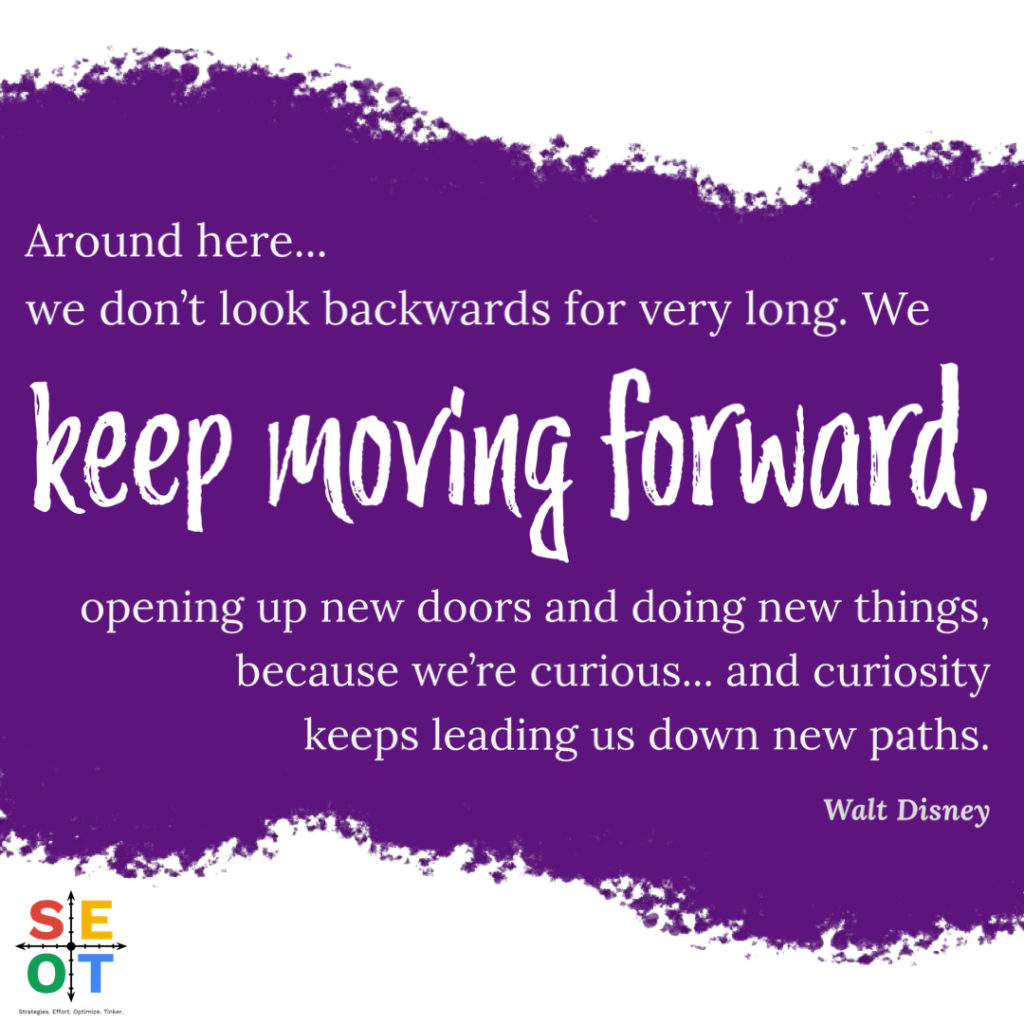
I think that strategy of being curious is a great way to keep going when times are tough. I wonder…
- I wonder why I respond that way?
- I wonder how I could make this work?
- I wonder how I could make more money from the internet?
- I wonder how I could keep being strong?
3. Inspiring students – former and future
But, ultimately, what keeps me going are the people I inspire – both former students, and future students.
I know me, and I know my limits. At this point, I doubt I’ll be able to ever handle a classroom teaching assignment again.
But I can still be a “teacher.” I still love talking about citizenship, character education, achieving goals and making the world a better place. I may not be able to have my own homeroom class again, but I can live vicariously through other teachers who use my lesson plans.
(The cool thing is that pretty much all of the teachers who have bought these lesson plans are teachers that I’ve never met before. So, it’s neat to think about students in the US and Australia learning from a lesson plan that I developed here, but never got a chance to use in the classroom… )
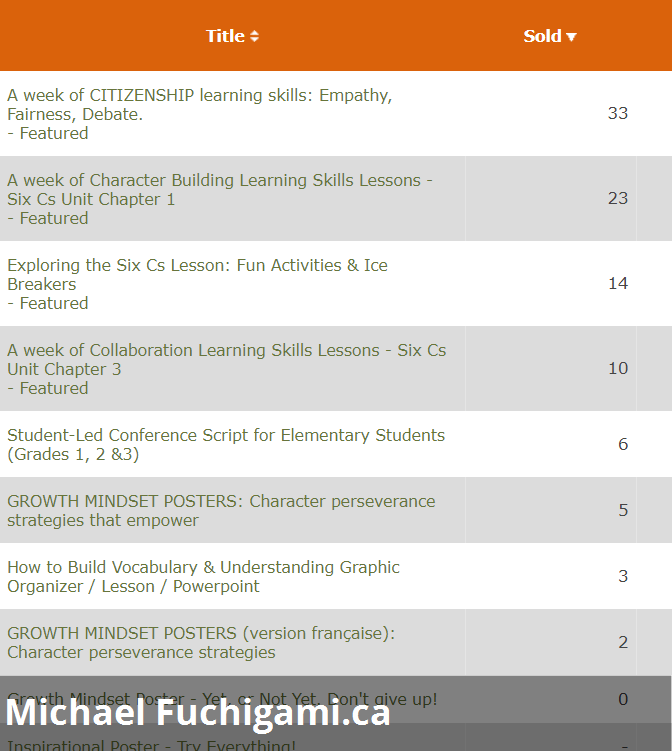
So, the bottom line is I can’t give up.
I really do like the Harry Potter series… a lot.
I often used him as an example for teaching main idea or theme in my Grade 8 literacy class. Ironically, despite being a literacy teacher, I rarely read novels.
In that case, I was a typical “boy” reader: I read a lot of practical non-fiction stuff from the internet.
What does a typical “boy” reader look like?
In 2004, the Ontario Ministry of Education published a practical guide to improving boys’ literacy skills: Me Read? No Way! It’s got some classic tried-and-true best practices and strategies in there that connect with some boys, but also a lot of other students irrespective of gender and gender identity.
“Although gender is a significant factor, it is not the only factor at play in determining performance in reading and writing. In fact, the differences among boys and among girls are greater than the differences between boys and girls. Consequently, educators must be careful not to focus on the gender differences between students, but rather to recognize
that the effectiveness of certain approaches in literacy instruction may be tied to gender”
The guide cites a 2003 survey where boys reported that “they read a wide variety of materials outside of school, including newspapers, comics, manuals or instructions, and magazines.” Flash-forward 16 years, and I’d argue a lot of that stuff would be online.
But this teaching resource also talks about how typical boys do like fiction: “books that reflect their image of themselves – what they aspire to be and to do; fiction that focuses on action more than on emotions; books in series, such as the Harry Potter series, which seem to provide boys with a sense of comfort and familiarity”
Anyway, all of this to say, I really like the Harry Potter books. (And yes, love is still the most powerful magic in the world.)
What does Harry Potter have to do with not giving up?
Back in 2006, before the seventh book was published – actually, while JK Rowling was writing it – there was some buzz around whether or not Harry would die in the final battle against Voldemort.
Rowling had hinted in the past that Harry might die. She joked that “while her fans may struggle with the deaths of favourite characters, ‘I’m toughening them up to go on and read John [Irving] and Stephen [King]’s books.’ ”
So why did JK Rowling keep Harry alive? Especially given that some fans feel the series would be stronger if Harry hadn’t survived.
“In some ways, it would have been a […] neater ending to kill him, but I felt it would have been a betrayal because I wanted my hero — and he’s my hero — to do what I think is the most noble thing,” Rowling explained in the 2007 documentary “J.K. Rowling: A Year In The Life.” “So he came back from war and he tried to build a better world I suppose, as corny as that sounds.”
SOURCE: BusinessInsider.com
Harry Potter shows us that the most noble thing to do after struggle and trauma is to “espouse [adopt] a normality after seeing horrors.” Rowling comments on how this “has always seemed to me to be such a courageous thing to do.”
“Climbing back to normality after trauma is much, much harder. It’s much harder to rebuild than to destroy.”
Source: 2007 Documentary, Youtube 29:11
So, I can’t give up. It would send the wrong message.
How do you make the worst moment of your life into the best moment of your life? I don’t know, yet.
But not being able to turn April 3 into a celebration of life would be a disservice to my daughter, my former students, and my future students.
Here’s what I know:
- The world needs better stories of hope than what we get from 13 Reasons Why and other similar narratives.
- You just can’t beat the person who never gives up. (Babe Ruth)
- You need patience. Some things take time.
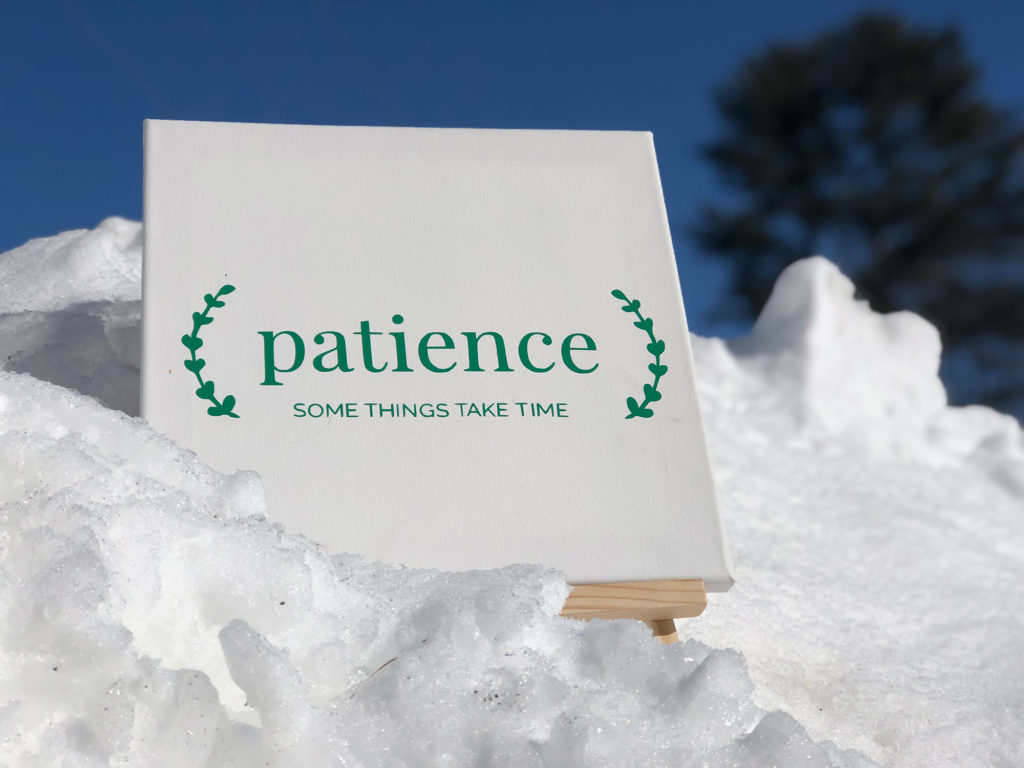
This was a letter that a former student wrote to me on my website:
I knew Zizo was part of ManUp and going to Calgary to present, but I had no idea until I read his comment on this website:
Mr Fuchigami,
My name is Zizo, and I had the privilege of being in your grade 8 class many years ago – the notorious “All Boys class”. I’m currently in my second year of Nursing at the University of Ottawa, and I was sent your website and article by a friend who you also taught many years ago.
I wanted to reach out to you and thank you, not only for the lives that you will reach out to through this article (because believe me, students are circulating it as we speak), but to thank you for the lives that you have already impacted through your time at LDHSS.
I say this from the bottom of my heart: There has been no teacher to this day that has taught me as much as you have. It was the little things that I still remember today (and that many of my good friends from the all boys class remember too, think of Taha, Iby, Derek, Rhys, etc..). It was how passionate you were about us learning instead of just trying to pass or get a good grade for the sake of the grade. It was how you never gave up on us as individuals and as a class, even though that was easily the worst behaved class in LDH history. It was how you weren’t afraid to cry when you talked about your daughter and how much you loved her. Its these things that I remember, and that have led me on such a straight and focused path, even with all the ongoing distractions.
I gave a presentation in Calgary on January 25th, 2019, well before I knew of your website, and before this article was posted. The presentation was on leadership, specifically in the context of ManUp; you may be familiar with ManUp, it was an initiative that started at LDHSS to raise awareness on violence against women. I went through an exercise with the audience called the “Manliest Man Exercise”, where I had them describe the most stereotypical “manliest man”, then I presented a contrasting view and asked the audience describe the man who has “had the most positive impact on their lives”.
Keep in mind that I had not seen this article, or your website leading up to my presentation, but I spoke to this Calgary crowd last month about YOU, being the man who had the most positive impact on my life. At such a vulnerable and easily impressionable age in our lives, you taught me key values like leadership, entrepreneurship (remember BassBook?), the ability to show emotion, and the value of education all within a year. Without your leadership and ability to keep faith in the all boys class and its students, you set me on the right path, and I cannot thank you enough.
I can promise you that there are hundreds of students with these same thoughts going through their mind, but you deserve to hear a first hand account of how incredibly influential you have been to me and my friends.
You have never backed down from a challenge, and I don’t expect that to change . Thank you for being the right influence at the right time, to me and so many others.
Zizo Aldaqqaq
Suffice it to say, that comment was the highlight of my 14-year teaching career. And it’s because of students like this, that I can’t give up.
Cheers, Mike
Day 92. Parts of this post were actually written over the summer of 2018 and revised and repurposed for this site. What can I say? I write. It helps me deal with my mental health crisis.
This post was written 92 days after Jan 1, 2019 – the first day of the rest of my life and 365 days after April 3, 2018 where things happened at Longfields Davidson Heights that would change my life forever.
[social_warfare]
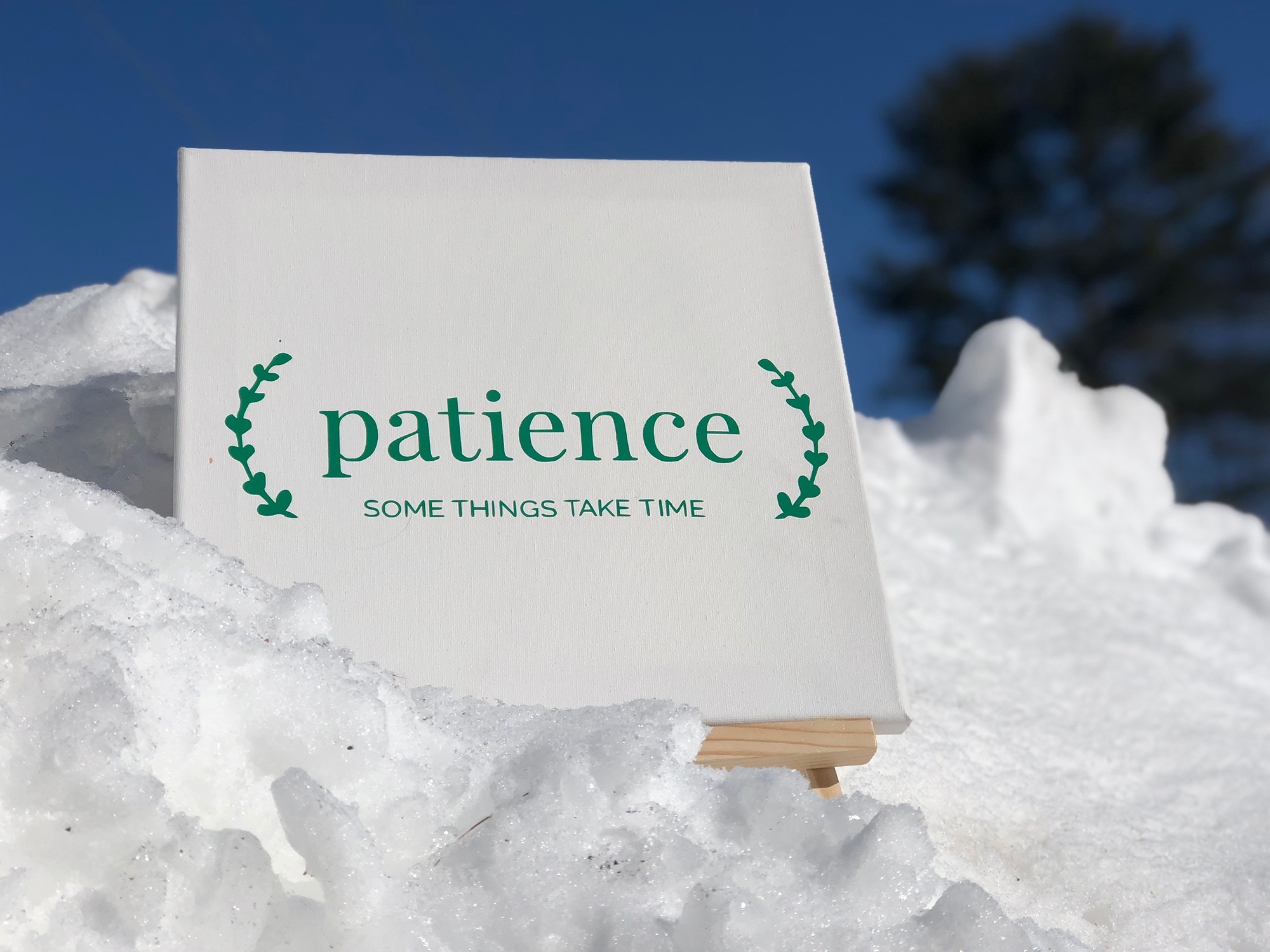
Happy birthday Mike !!
You can do it , I knew You can do it.
Mass
ps, Pls add my name in your mailing list. see you soon.